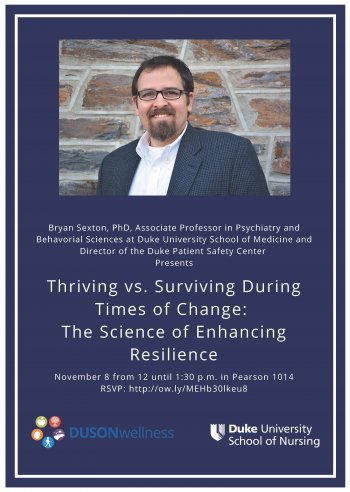Thriving vs. Surviving During Times of Change: The Science of Enhancing Resilience
 Bryan Sexton, PhD, associate professor in Psychiatry and Behavioral Sciences at Duke University School of Medicine will present a talk at DUSON entitled "Thriving vs. Surviving During Times of Change: The Science of Enhancing Resilience" on Thursday, Nov. 8 from 12 until 1:30 p.m. in Pearson 1014.
Bryan Sexton, PhD, associate professor in Psychiatry and Behavioral Sciences at Duke University School of Medicine will present a talk at DUSON entitled "Thriving vs. Surviving During Times of Change: The Science of Enhancing Resilience" on Thursday, Nov. 8 from 12 until 1:30 p.m. in Pearson 1014.
Enhancing resilience through the Bite-Sized Resilience Series at Duke is about refilling the largely depleted buckets of our emotional, spiritual, cognitive and physical reserves.
Quality improvement efforts frequently ignore the need to make sure that health care workers are ready for the next big initiative and rarely do they first build up the resilience of staff before expecting even higher levels of quality and safety to be delivered. For some, jumping into innovation is a reasonable first step. But for many individuals and work units, there needs to be a focus on the workers, and their needs, to build capacity and bounce back from burnout, before providing the training and the tools to improve quality in a sustainable way.
The Bite-Sized Resilience Series is a special offering by the Duke Patient Safety Center, designed to meet the needs of our patient safety and quality improvement communities.
Sexton has captured the wisdom of frontline caregivers through rigorous assessments of safety culture, teamwork, and workforce resilience. His research instruments have been used around the world in over 3000 hospitals, in 30 countries. His current R01 grant from NIH is a randomized clinical trial of resilience training. He has studied teamwork, safety and resilience in high-risk environments such as the commercial aviation cockpit, the operating room, and the intensive care unit, under funding from NIH, NASA, AHRQ, Robert Wood Johnson Foundation, Swiss National Science Foundation, and the Gottlieb Daimler and Karl Benz Foundation.
With specializations in organizational assessment, teamwork, survey development, and quantitative methods, he spends his time teaching, mentoring, conducting research, and finding practical ways of getting busy caregivers to do the right thing, by making it the easy thing to do. He has found that results across industries, work settings, shifts, professions and countries highlight a great deal about reliability in high-risk environments – specifically, “you are better off changing the situation, than trying to change human nature.”
RSVP to attend the talk here: https://duke.qualtrics.com/jfe/form/SV_6RRlBkatcYLnm8R